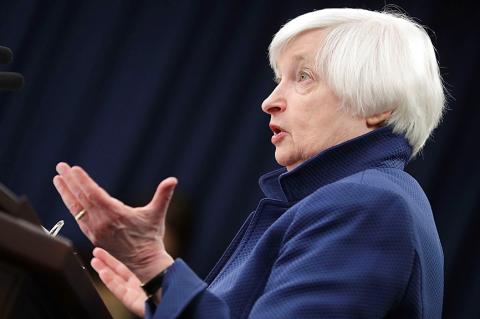The long cycle of falling interest rates in Asia could be over after the US Federal Reserve’s third rate increase in 15 months was followed quickly by monetary tightening in the world’s second-biggest economy, China.
The Fed’s widely anticipated rise of 25 basis points on Wednesday was also only its third since the global financial crisis, having reined in earlier temptations to raise rates out of concern for the effect on fragile emerging economies that still needed looser monetary conditions.
However, the Fed again signaled that such reticence is over, repeating its projections for at least two more rate increases this year as the US economy improves.

Photo: AFP
“At the very least, the Fed’s desire to step up the pace of policy normalization has changed the conversation at many central banks globally,” said Sean Callow, an economist with Westpac in Sydney.
“Further monetary easing is now largely seen as only if needed to ‘break the glass,’ not a plausible baseline,” Callow said.
The People’s Bank of China yesterday raised the rates on the short-term funding operations it conducts for the nation’s banks for a third time this year.
The Fed’s move would otherwise make it harder for China to stop its currency weakening and arrest a persistent outflow of capital. China also wants to cool a run-up in debt and the risk of a property bubble.
The Bank of Japan’s regular policy meeting yesterday opted to stand pat with its 0.1 percent short-term interest rate target and a loose commitment to keep buying bonds, though core inflation is far below its ambitious 2 percent target.
The Fed’s new policy path is a sea change for global markets used to a decade of easy money.
While emerging markets are showing some signs of strength, with a recovery in commodity prices and growth in exports, they are struggling to fire up domestic demand.
However, their freedom to fit domestic rates to local demand conditions is constrained by the need to keep hold of the foreign capital that flooded in seeking higher yields when developed world rates were at rock bottom.
They also need to prevent their currencies from tumbling against a rallying US dollar.

US President Donald Trump yesterday announced sweeping "reciprocal tariffs" on US trading partners, including a 32 percent tax on goods from Taiwan that is set to take effect on Wednesday. At a Rose Garden event, Trump declared a 10 percent baseline tax on imports from all countries, with the White House saying it would take effect on Saturday. Countries with larger trade surpluses with the US would face higher duties beginning on Wednesday, including Taiwan (32 percent), China (34 percent), Japan (24 percent), South Korea (25 percent), Vietnam (46 percent) and Thailand (36 percent). Canada and Mexico, the two largest US trading

China's military today said it began joint army, navy and rocket force exercises around Taiwan to "serve as a stern warning and powerful deterrent against Taiwanese independence," calling President William Lai (賴清德) a "parasite." The exercises come after Lai called Beijing a "foreign hostile force" last month. More than 10 Chinese military ships approached close to Taiwan's 24 nautical mile (44.4km) contiguous zone this morning and Taiwan sent its own warships to respond, two senior Taiwanese officials said. Taiwan has not yet detected any live fire by the Chinese military so far, one of the officials said. The drills took place after US Secretary

CHIP EXCEPTION: An official said that an exception for Taiwanese semiconductors would have a limited effect, as most are packaged in third nations before being sold The Executive Yuan yesterday decried US President Donald Trump’s 32 percent tariff on Taiwanese goods announced hours earlier as “unfair,” saying it would lodge a representation with Washington. The Cabinet in a statement described the pledged US tariffs, expected to take effect on Wednesday next week, as “deeply unreasonable” and “highly regrettable.” Cabinet spokeswoman Michelle Lee (李慧芝) said that the government would “lodge a solemn representation” with the US Trade Representative and continue negotiating with Washington to “ensure the interests of our nation and industries.” Trump at a news conference in Washington on Wednesday announced a 10 percent baseline tariff on most goods

THUGGISH BEHAVIOR: Encouraging people to report independence supporters is another intimidation tactic that threatens cross-strait peace, the state department said China setting up an online system for reporting “Taiwanese independence” advocates is an “irresponsible and reprehensible” act, a US government spokesperson said on Friday. “China’s call for private individuals to report on alleged ‘persecution or suppression’ by supposed ‘Taiwan independence henchmen and accomplices’ is irresponsible and reprehensible,” an unnamed US Department of State spokesperson told the Central News Agency in an e-mail. The move is part of Beijing’s “intimidation campaign” against Taiwan and its supporters, and is “threatening free speech around the world, destabilizing the Indo-Pacific region, and deliberately eroding the cross-strait status quo,” the spokesperson said. The Chinese Communist Party’s “threats